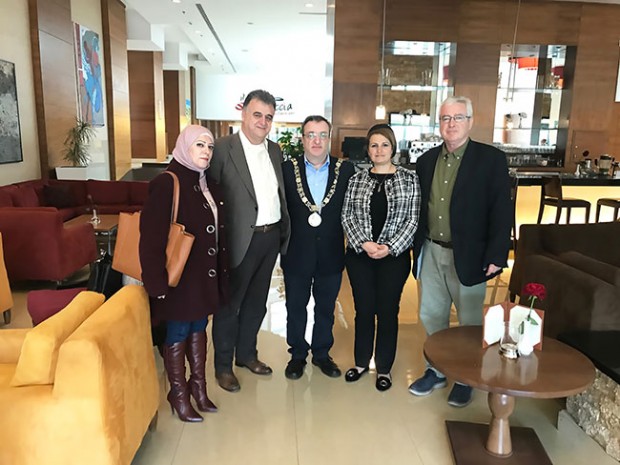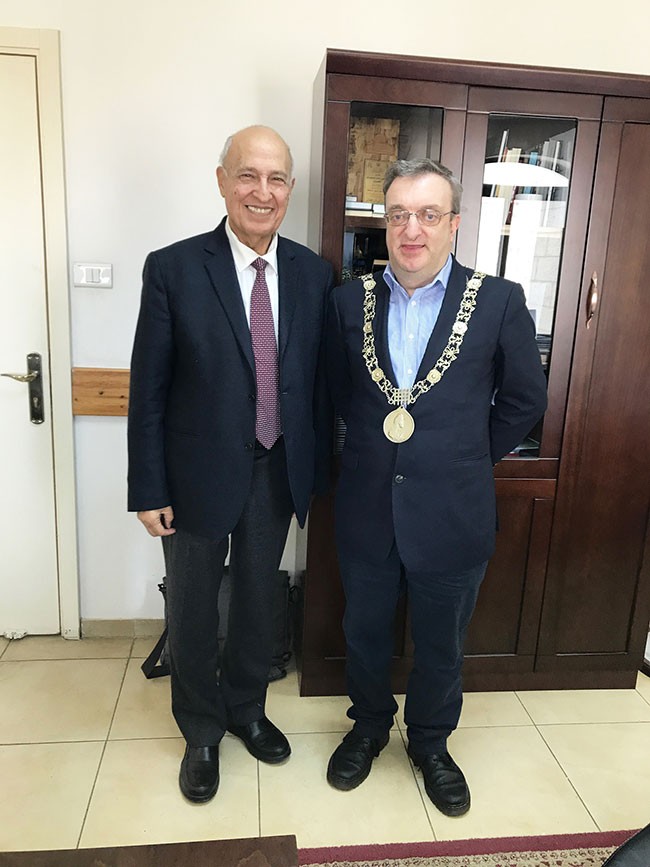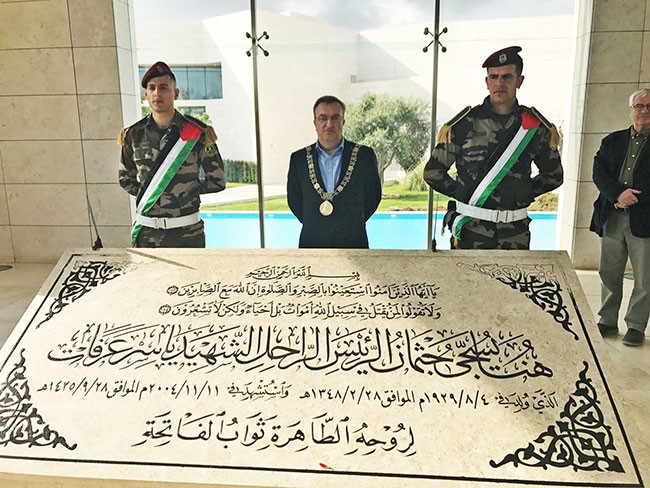30 September 2018 Edition
That ‘banned’ visit to Palestine
Inside story

• Meeting Palestinian trade union leaders with Frank Connolly (right) of SIPTU
As Ardmhéara Bhaile Átha Cliath Mícheál Mac Donncha made an official visit to Palestine which the Israeli state tried and failed to stop. Here he describes that visit. ‘Israel plays blame game over typo that let Dublin Lord Mayor barred over BDS to enter’, so ran the headline in Haaretz, the Israeli daily newspaper on Friday 13 April 2018. It was indeed an unlucky day for the Israeli government as their plans to block me from entering Palestine backfired.
On 21 February 2018 I was invited by the Ambassador of Palestine in Dublin, Ahmed Abdelrazek, on behalf of Dr Mahmoud al Habbash, the Supreme Judge of Palestine, to speak at the Ninth International Bayt Al Maqdis (Jerusalem) Conference in Ramallah on 11 & 12 April. I travelled to Ramallah via Frankfurt and Tel Aviv on 10 April.
The day before my visit the April monthly meeting of Dublin City Council had called for the expulsion of the Israeli ambassador in protest at the killings of protesters in Gaza by the Israeli military. This was one of two motions adopted by the council. They had also one endorsed the campaign of Boycott/Divestment/Sanctions (BDS) against the Israeli state due to its treatment of the Palestinians. It appears that it was in response to these motions that the Israeli Ministry for Strategic Affairs hastily decided to prevent my entry to Palestine. However, when I landed at Tel Aviv Airport I was permitted through passport control without incident.
On the evening of 10 April, as I prepared for the conference the next day in my hotel in Ramallah, I received word from my office in Dublin that the Israeli government’s Interior Minister Arye Dery and Strategic Affairs Minister Gilad Erdan had stated that I had been stopped from entering Israel because of my support for BDS. I immediately made it known that I was in fact in Ramallah and knew nothing of a ban which had not been communicated to me in any way. I have still not received any such communication.
The Interior Ministry claimed that I was allowed through because my name was spelt incorrectly in the request it had been given by the Strategic Affairs Ministry to block me. However, the latter ministry claimed the name was spelt correctly. The Interior Minister ordered an investigation. There was speculation that the error was the inclusion of the title Ardmhéara as part of my name, though this has not been confirmed.
I attended the conference on 11th and 12th April. The conference was especially significant in the context of the decision of the US Administration to recognise Jerusalem as the capital of the state of Israel. There were delegates from Palestine and from many other countries (including EU member states) and they were public representatives, religious leaders of various denominations and faiths, trade unionists and other civil society representatives. Almost 50 people, one third of the delegates, were prevented from entering Palestine by the Israeli government. This included a delegation from India, only two of whom were allowed entry, apparently because one of them was a former government minister in India.
On the morning of 11 April I spoke in the conference session on the importance of Jerusalem. Later that day I met the Mayor of Ramallah, Mosa Hadid, at his mayoral office.
In the company of Frank Connolly of SIPTU, who was visiting Palestine as a trade union representative, I met Shaher Saad, General Secretary of the Palestine General Federation of Trade Unions.
That evening the conference delegates were addressed by Mahmoud Abbas, President of the Palestinian Authority.
On 12 April, as well as attending the conference I met with the Palestinian Minister for Jerusalem Affairs Adnan Al Hussaini.
We were facilitated to meet Dr Nabil A Shaath, foreign policy advisor to President Abbas, and a long-time Palestinian diplomat. And we met with Palestinian civil society campaigners for BDS.

• Dr Nabil Shaath, foreign policy advisory to the Palestinian presidency, with Mícheál Mac Donncha
We left Palestine on 13 April. At Tel Aviv Airport Immigration I was presented with a form stating that I had been informed that should I wish to re-enter Israel I would have to seek permission. I signed this form and was permitted to leave after a delay of about 15 minutes. I was not asked to give, nor did I give, any commitment not to return to Palestine, contrary to the spin put out by the Israeli government.
Our visit coincided with the ongoing killings of protesters in Gaza by the Israeli military. Even within Israeli society itself there was much opposition to this, summed up in a headline in the Israeli daily ‘Haaretz’ which said: ‘Don’t believe a word Israel says about Gaza.’ There was also much anger at the false Israeli claim that a photographer killed in Gaza by the Israeli military on the Friday before our visit had not been a journalist but a Hamas activist. The International Federation of Journalists accused Israel of engaging in a cover-up of the murder.
Throughout the visit I learned of the ongoing plight of the Palestinian people, in a society which is, in effect, an open prison. We learned from the trade unionists of the apartheid-style pass system for the many thousands of Palestinians who work in Israeli areas and are under curfew to leave those areas when their work is done. The West Bank, supposedly under Palestinian authority, is split into zones under various degrees of Israeli control, while everywhere illegal settlements continue to be built. We witnessed the wall which separates Israeli from Palestinian areas and which severely disrupts working, family and social life for ordinary Palestinians.
There is clearly no intention on the part of the current Israeli government to engage in any meaningful peace process. As Dr. Nabil Shaath explained to us, what is needed now is an internationally led peace process, headed by credible governments. It is also important that full recognition is given to the State of Palestine by all the EU member states, including Ireland.
I believe what we witnessed during our visit vindicates the support for justice for Palestine and a real and lasting peace settlement between Palestine and Israel as repeatedly advocated by the elected members of Dublin City Council. There was much respect for the position taken the Council, by the Irish government and by Irish people generally in support of Palestine.

• At the tomb of Yasser Arafat in Ramallah
The significance of Jerusalem
Jerusalem is a place of huge cultural and religious significance for people all over the world, including in Ireland. Three major world religions - Islam, Judaism and Christianity - hold the city of Jerusalem sacred. I believe the attempt by any one state or religion to exclusively control Jerusalem is wrong. That is why the formal recognition of Jerusalem as the capital of Israel by the US administration was wrong. It was a backward step for peace and a negotiated settlement.
A hundred years ago the people of both Ireland and Palestine were victims of imperialism as their right to self-determination was denied. In both countries so-called solutions were imposed which condemned their peoples to a century of division, oppression and strife.
The suffering of the Palestinian people under occupation, exile, mass imprisonment, killings such as the most recent in Gaza, and a catalogue of human rights abuses, has horrified people all over the world. However, the international community, and particularly EU governments, have failed to hold Israeli governments to account for their abuses of human rights. It is time that this policy of standing idly by in the face of horror came to an end.
Mícheál Mac Donncha is a Sinn Féin Councillor, and was Dublin’s Lord Mayor from July 2017 to June 2018.




